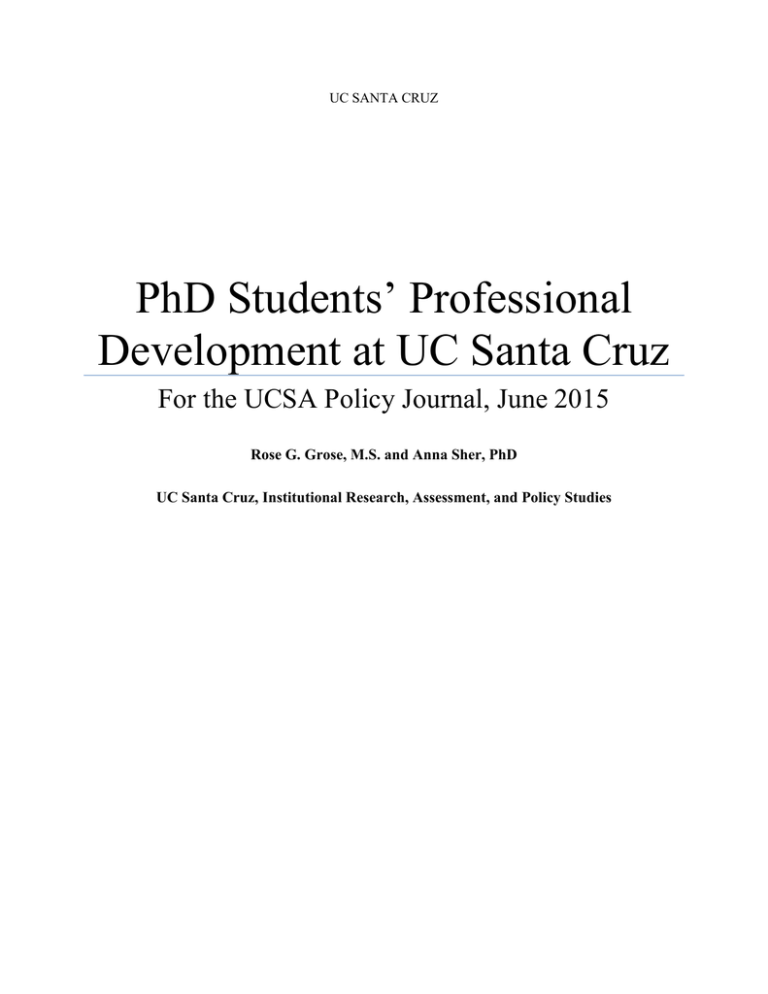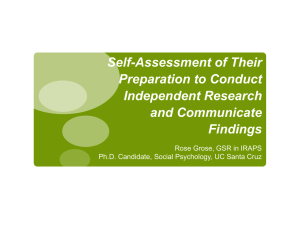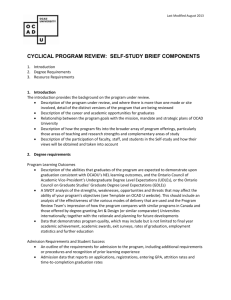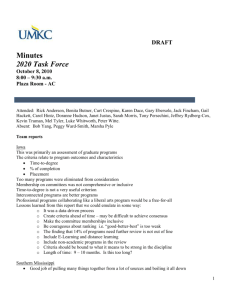PhD Students’ Professional Development at UC Santa Cruz
advertisement

UC SANTA CRUZ PhD Students’ Professional Development at UC Santa Cruz For the UCSA Policy Journal, June 2015 Rose G. Grose, M.S. and Anna Sher, PhD UC Santa Cruz, Institutional Research, Assessment, and Policy Studies 1 Grose & Sher, UCSA Policy Journal PURPOSE AND BACKGROUND A key step toward improving professional development opportunities for graduate students within the University of California (UC) is to understand the scope of their needs and experiences. At UC Santa Cruz (UCSC) the Division of Graduate Studies and the office of Institutional Research, Assessment, and Policy Studies have conducted a biennial Graduate Student Survey (GSS) since 2007. This survey provides data that can help identify gaps in PhD students’ professional development and career readiness in order to make recommendations for policy improvement and resource allocation at UCSC. Specifically, the GSS collects comprehensive data on student satisfaction with various aspects of their graduate studies including the curriculum, faculty teaching and mentorship, availability and quality of resources, Teaching Assistant training, and climate in the department. The current report summarizes the key findings on students’ self-evaluation of their preparedness to carry out various professional tasks such as conducting independent research, preparing scholarly articles for publication, and making presentations. In addition, it outlines evidence-based professional development policy recommendations derived from the GSS in order to better serve graduate students at UCSC. METHODOLOGY Participants This brief report examines data from the last GSS administration in 2013.1 All enrolled graduate students were invited to participate and logged in to the survey system using their official UCSC login. In 2013, 55% of eligible participants responded, representing all five of UCSC’s academic divisions: the Arts, Humanities, Social Sciences, School of Engineering (SOE) and Physical and Biological Sciences (PBSci). For the current analysis we focus on students enrolled in doctoral programs at UCSC. In order to analyze the professional development experiences of students who were advanced in their graduate programs, we selected PhD students who indicated that they had completed their coursework and excluded students who were in the beginning of their doctoral studies. A total of 386 graduate students are included in our sample for this report (see Table 1). Please note that there may be a different number of total respondents for each question analyzed below due to some students skipping individual questions. Table 1. 2013 Graduate Student Survey respondent characteristics Gender Ethnicity Comparison Groups Men Women Asian American Hispanic/Latino Other Underrepresented Minorities* Non-Hispanic White Arts 30% 70% 10% 0% Humanities 36% 64% 10% 10% Social Sciences 31% 69% 20% 12% SOE 69% 31% 26% 8% PBSci 50% 50% 17% 11% Total 47% 53% 19% 10% 20% 10% 11% 5% 7% 8% 70% 69% 58% 62% 65% 63% *Other underrepresented minorities included students who identified as American Indian or Alaska Native, African American/Black, Native Hawaiian, or Pacific Islander. 1 The 2015 survey data collection is currently underway. 2 Grose & Sher, UCSA Policy Journal RESULTS Career Expectations In order to better understand what kinds of professional development PhD students at UCSC may need, we analyzed students’ expectations for professional employment immediately after they receive their graduate degree. Overall at UCSC 65% of advanced PhD students intend to pursue an academic career while 35% plan on going into non-academic fields (see Table 2). Unsurprisingly, the ratio of students interested in academic versus non-academic careers varied across academic divisions. For example, the vast majority of students in the Arts and Humanities divisions intend to go into academia while just 39% of those in the SOE said they will pursue academic jobs. These cross-divisional differences are important to consider when analyzing students’ career aspirations and preparedness, and when developing appropriate professional development training. Table 2. Current expectations for professional employment by academic division Arts Humanities Social Sciences Tenure track faculty position at university/college 40% 33% 28% 11% 13% 19% Non-tenure track faculty position at university/ college (including visiting, adjunct) 30% 43% 18% 4% 4% 13% Postdoctoral researcher, fellow, or associate 10% 8% 19% 11% 45% 26% 0% 0% 7% 14% 6% 7% 80% 82% 71% 39% 68% 65% 0% 3% 13% 41% 16% 19% Other teaching position 10% 3% 7% 1% 2% 3% Other non-academic position 10% 13% 9% 19% 13% 14% Total Non-Academic 20% 18% 29% 61% 32% 35% 10 40 90 74 142 356 Researcher, academic setting (university, national lab, medical center) Total Academic Researcher, non-academic setting (industry, government) Total N SOE PBSci Total Preparation for Professional Tasks The survey asked students to think about their graduate training at UCSC and evaluate their current preparation to: 1. Find academic and non-academic jobs following graduation, 2. Conduct independent research/scholarship, 3. Write scholarly articles for publication, 4. Write proposals to obtain funding, 5. Make presentations for academic and non-academic audiences, 6. Teach undergraduate and graduate students. 3 Grose & Sher, UCSA Policy Journal Students rated their preparation in these areas on a 5-point scale (excellent, good, fair, poor or very poor). For the purposes of this analysis we designate as “underprepared” those who rated their preparation as fair, poor, or very poor. We examined differences and similarities in professional development training between the academic divisions, between men and women,2 and among different ethnic groups (White, Asian American, Hispanic/Latino, and other underrepresented minorities) using Chi-Square analysis. Arts Division students were excluded from group difference tests between academic divisions due to the low number of respondents, but they are included in all reported total frequencies. Preparation to find a job We analyzed students’ self-reported preparation to find academic and non-academic jobs following graduation separately for those who intended to pursue academic and non-academic careers. This distinction was made in order to understand the gaps in students’ preparation for the careers they actually intend to pursue. Overall at UCSC, 43% of students who want an academic career reported being underprepared to find an academic job following graduation (i.e., rated their preparation as fair, poor, or very poor). The highest proportion of underprepared students was found in the Social Sciences division (53%). In the PBSci division, however, just 36% of advanced PhD students reported being underprepared (see Figure 1). The differences in the proportion of underprepared students across academic divisions were not statistically significant. Figure 1. Students who want an academic career: Percentage reporting fair/poor/or very poor preparation to find an academic job. 100% 80% 60% 52.5% 41.4% 37.5% 36.0% 42.7% 40% 20% 0% Humanities Soc Sci SOE PBSci Total Across UCSC, 53% of students who want a non-academic career reported being underprepared to find a non-academic job following graduation. In the Humanities, Social Sciences, and PBSci divisions, over 50% of students who want a non-academic career reported being underprepared to find a non-academic job following graduation, while just one-third (34%) of SOE students were underprepared (see Figure 2). Furthermore, the difference between the SOE and the Social Sciences was statistically significant. 2 The analysis compared men’s and women’s experiences. We did not have a sufficiently large number of respondents with other gender identities for inclusion in a statistical analysis as a separate group(s). 4 Grose & Sher, UCSA Policy Journal Figure 2. Students who want a non-academic career: Percentage reporting fair/poor/or very poor preparation to find a non-academic job. 82.6% 100% 80% 66.7% 51.2% 60% 53.2% 34.2% 40% 20% 0% Humanities Soc Sci SOE PBSci Total Gender and Ethnic Group Differences At UCSC women interested in an academic career rated their preparation to find an academic job after graduation significantly lower than men who want an academic career (49% versus 33% rated their preparation as fair, poor, or very poor). This gender difference was particularly pronounced in the Social Sciences division, in which 63% of women and 20% of men reported being underprepared to find an academic job. However, for students who wanted non-academic careers, there were no gender differences in ratings of preparation to find non-academic jobs. There were no significant differences based on race and ethnicity in regards to students’ preparation to find academic and non-academic jobs. Preparation to engage in research and academic writing We found that among all PhD respondents who had completed their coursework, many reported being underprepared to carry out professional tasks related to research and writing, specifically conducting independent research, writing proposals to obtain funding, and writing scholarly articles for publication (see Figure 3). Overall at UCSC, 22% indicated that they were underprepared to conduct independent research/scholarship. The proportion of students who were underprepared ranged from 16% in the PBSci division to 34% in the Social Sciences. The PBSci and Social Sciences divisions differed significantly, in that students in the Social Sciences were statistically more likely to report being underprepared to conduct independent research/scholarship than PBSci students. Across UCSC over half (54%) of advanced PhD students reported being underprepared to write proposals to obtain funding. The highest proportion of underprepared students was found in the SOE (73%), which was significantly different from the lowest proportion (47%) in PBSci. When asked to rate their preparation to write scholarly articles for publication, over onethird (37%) of UCSC advanced PhD students reported being underprepared. Social Sciences students were significantly more likely to be underprepared than those in the PBSci division (50% versus 29% reported fair, poor, or very poor preparation). 5 Grose & Sher, UCSA Policy Journal Gender and Ethnic Group Differences We found no gender differences in student self-reported preparation to conduct independent research at UCSC. However, women rated their preparation to write scholarly articles for publication significantly worse than men (45% versus 28% were underprepared). In contrast, men rated their preparation to write proposals to obtain funding significantly worse than did women (61% versus 48% rated their preparation as fair, poor, or very poor). This gender difference was particularly pronounced in the PBSci division (58% of men versus 36% of women rated their preparation as fair, poor, or very poor). There were no significant differences based on race and ethnicity in regards to students’ preparation to engage in research and to write for grants and publications. Figure 3. Percentage of advanced PhD students who rated their preparation as Fair, Poor, or Very Poor 22% 54% Total 37% 16% 47% PBSci 29% 23% 73% SOE 32% 34% 53% 50% Soc Sci Conduct independent research/scholarship Write proposals to obtain funding Write scholarly articles for publication 18% 48% 44% Humanities 0% 20% 40% 60% 80% 100% Preparation to teach and deliver presentations Among all PhD respondents who had completed their coursework, many indicated being underprepared to make presentations to academic and non-academic audiences or to teach (see Figure 4). Specifically, 18% of advanced graduate students were underprepared to make presentations to academic audiences. This proportion ranged from 13% in Humanities to 27% in the Social Sciences. In contrast, 41% of advanced PhD students across UCSC reported being underprepared to make presentations to non-academic audiences. The highest proportion of underprepared students was in the Social Sciences (60%) and Humanities (58%). PBSci and SOE students were significantly more prepared. When asked to rate their preparation to teach undergraduate or graduate students, over one-quarter (29%) of UCSC advanced PhD students reported being underprepared. There were no significant differences among the academic divisions in this area. 6 Grose & Sher, UCSA Policy Journal Figure 4. Percentage of advanced PhD students who rated their preparation as Fair, Poor, or Very Poor 18% Make presentation to academic audiences 41% Total 29% 16% 31% PBSci Make presentation to non-academic audiences 36% 16% 32% SOE 23% Teach undergraduate or graduate students 27% 60% Soc Sci 30% 13% 58% Humanities 18% 0% 20% 40% 60% 80% 100% Gender and Ethnic Group Differences We found no gender differences in students’ self-reported preparation to make presentations to academic audiences. However, women rated their preparation to make presentations to non-academic audiences significantly worse than did men (47% versus 35% rated their preparation as fair, poor, or very poor). No significant gender differences were found in graduate students’ perception of their preparation to teach in all divisions except the Humanities division. In the Humanities, women were more likely than men to report being underprepared to teach undergraduate and graduate students (29% versus 0% rated their preparation as fair, poor, or very poor). There were no ethnic group differences in students’ reported levels of preparation to teach or make presentations. Workshop Availability One way that departments can prepare PhD students for professional tasks is by offering workshops pertaining to important skills needed for academic and non-academic careers. Figures 5 and 6 show that the percentage of respondents reporting that their program offered such workshops varied considerably by academic division. 7 Grose & Sher, UCSA Policy Journal Figure 5. Percent of respondents in each division reporting that their PhD program offers classes/ workshops in these areas 100% 80% 59% 60% 38% 40% 20% Conducting dissertation research 48% 43% 46% 33% 26% 24% 23% 21% 31% 26% 43% 31% 32% Writing and publishing scholarly articles Grant writing 0% Humanities Soc Sci SOE PBSci Total Figure 6. Percent of respondents in each division reporting that their PhD program offers classes/ workshops in these areas 100% 80% Academic job search and interviews 63% 60% 53% 36% 40% 20% 19% 22% 26% 28% 25% 22% Non-academic job search and interviews 12% 0% Humanities Soc Sci SOE PBSci Total These findings indicate irregular availability and a shortage of professional development classes and workshops in these areas across programs, and/or that there is insufficient visibility of offerings. In addition to the departmental workshops and seminars, students access such resources outside of their departments (i.e., through the Graduate Division, Graduate Student Commons, and at professional conferences). Nevertheless, students’ self-reported levels of underpreparedness strongly suggest that the university should provide more field-relevant and career-specific information and trainings. CONCLUSIONS AND POLICY RECOMMENDATIONS Academic careers The majority of PhD students we surveyed plan to pursue academic careers, yet 43% of them reported being underprepared to find an academic job following graduation. Across academic divisions many students reported being underprepared for important tasks required of academic careers, in particular for writing proposals to obtain funding and scholarly articles for 8 Grose & Sher, UCSA Policy Journal publication. The survey findings suggest an urgent need for increased professional development for graduate students. We recommend that the university and academic departments: 1. Incentivize the graduate program directors and graduate committees in all academic departments to provide resources and training related to academic jobs: o Regularly offer workshops about the academic job search and interviews, including guidance for negotiating salaries. o Regularly offer graduate courses in grant-writing to help students prepare grant proposals and get feedback (i.e., Psyc290E: Grant Writing for Psychologists). o Regularly offer workshops about each stage of conducting dissertation research (design, proposal writing, strategies for long-term planning, etc.). 2. Provide training to all students about the gendered nature of the academic job market: o Provide training about how to recognize and cope with gender bias and discrimination in academia. o Hold work-life balance workshops so women feel more prepared and welcome in academia while here at UCSC. 3. Fund efforts that address the lack of training in academic writing: o Offer organized writing retreats. Retreats could be for several hours or several days and create a space to collaborate. To provide additional support and close the gap we found between men and women in their perceived preparation to write scholarly articles, some of these retreats could be women-only. o Provide accessible resources for students who want to start their own dissertation writing groups. o Establish a Writing Partnership Program (such as the one at UC Davis) which helps graduate students connect with fellow students interested in writing support and peer review. Non-academic careers A number of students across academic divisions at UCSC intend to pursue non-academic careers, yet half of them reported being underprepared. We recommend that the university and academic departments: 1. Openly acknowledge that their programs and faculty advisors should prepare students for both academic and non-academic careers. 2. Provide professional development training and resources for pursuing both academic and non-academic career tracks. 3. Incentivize the graduate program directors/graduate committees in all academic departments to provide resources and training related to non-academic jobs: o Regularly offer workshops about the non-academic job search and interviews. Although some departments are currently offering these workshops, the rates were lower than for all other types of workshops. o Create and distribute a list or database of non-academic jobs related to the department’s academic focus. Include an explanation of the transferrable skills 9 Grose & Sher, UCSA Policy Journal students could develop in a PhD program that are applicable to those specific jobs. o Distribute a list of resources (websites, databases) through which students can search for non-academic jobs when they reach that stage. o Connect current students with alumni who have entered non-academic jobs. o Provide funds to bring alumni to speak on panels/brown bag lunches about entering the non-academic job market, developing professional connections off-campus, and other topics. 4. Fund professional internships so graduate students can gain non-academic career experience. Other Recommendations We recommend: 1. That the Graduate Division reevaluate keeping the main source of professional development resources for graduate students on the Career Center’s website. o Many large universities have a website for dedicated to professional development that addresses training at all stages of graduate work, not just at the end-stage when the student goes on the job market (see the professional development program at UC Davis for an example). 2. That the Career Center more proactively promote their resources for graduate students after the orientation week for new graduate students in the following ways: o Setting up meetings with the graduate students at their respective departments to promote career center resources. o Additional outreach for students to seek the Career Center’s resources prior to the job market. o Updating online materials regularly—especially alumni lists. o Holding workshops on the best ways to use Versatile PhD. o Record the workshops offered in various academic departments or at the Graduate Student Commons and post them online.






